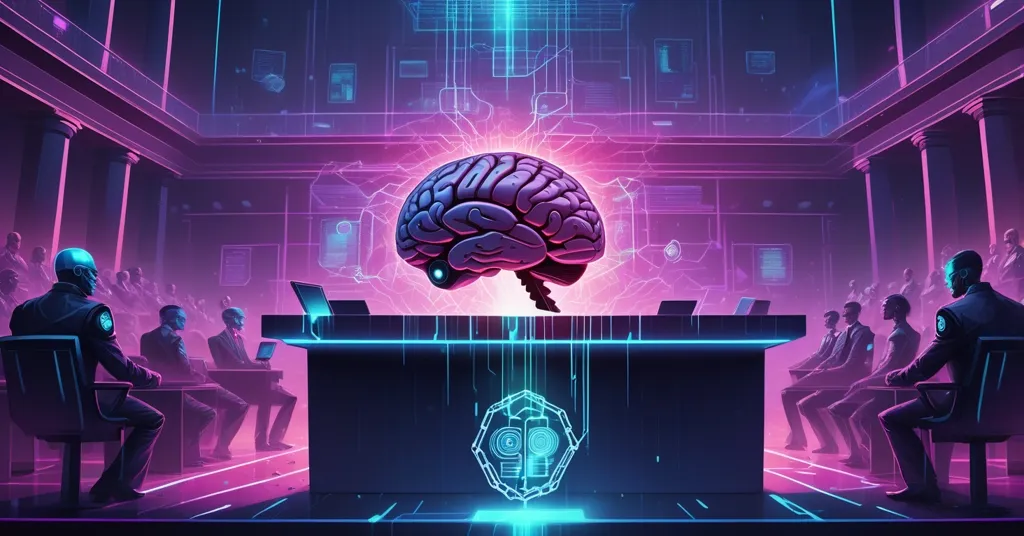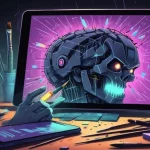Stability AI Wins UK Lawsuit Against Getty: AI Training Data Debate Heats Up

Stability AI Beats Getty Images in UK Copyright Lawsuit: AI Training Data Debate Ignites
Stability AI has emerged victorious in a landmark UK high court battle against Getty Images, with the judge ruling that the AI firm did not violate copyright laws by training its generative models on internet-sourced photographs. This AI copyright lawsuit is more than a legal skirmish—it’s a critical flashpoint in the escalating tension between creative industries and the unstoppable rise of artificial intelligence, with ripple effects that could reshape data rights, innovation, and even how blockchain tech intersects with creativity.
- Core Verdict: Stability AI cleared of copyright infringement for using web images in AI training.
- Trademark Snag: Getty watermarks in generated images ruled as trademark violation.
- Wider Stakes: Exposes legal uncertainties in AI training data and sparks debates on creative rights.
The Courtroom Clash: Stability AI vs. Getty Images
At the center of this dispute was Getty Images’ claim that Stability AI, a pioneer in generative AI with tools like Stable Diffusion, illicitly used its massive catalog of copyrighted photos to train models capable of producing stunning, machine-generated visuals. Getty argued this was tantamount to building a business on stolen intellectual property. For the uninitiated, AI training involves feeding algorithms vast datasets—think millions of images scraped from the internet—so they can identify patterns and generate new content inspired by what they’ve processed. It’s not a direct copy machine; imagine a hyper-speed artist who studies countless paintings to create an original piece, but without storing the exact originals in memory.
The UK high court, however, didn’t buy Getty’s core argument. The judge determined that under current UK copyright law, a trained AI model isn’t considered an infringing copy unless it directly reproduces the source material. In plain terms, the “learning” process Stability AI employed—however eyebrow-raising to some—didn’t legally equate to theft. This is a pivotal distinction, as it shields AI companies from broad copyright claims, at least for now. But the case wasn’t a total wash for Getty. The court did slap Stability AI with a trademark infringement ruling in instances where generated images bore visible Getty watermarks. Think of it as a knockoff product accidentally sporting the real brand’s logo—it muddies the waters about the content’s true origin, which is a clear violation in trademark law.
Adding a layer of complexity, Getty had to retract part of its lawsuit mid-trial when it couldn’t prove that Stability AI’s training activities even took place on UK soil. This jurisdictional hurdle—trying to enforce laws when digital operations span multiple countries with differing rules—highlights a brutal challenge for copyright holders. Tracking where and how AI training happens in a borderless internet landscape is like chasing a ghost through the cloud. Stability AI, unsurprisingly, hailed the copyright win as a vindication. Their general counsel expressed satisfaction, noting the fundamental question of training on public data has been settled in their favor, as detailed in the recent UK court decision on Stability AI versus Getty. Getty, on the other hand, remains deeply unsettled, lamenting the uphill battle to protect creators under outdated frameworks and calling for stricter regulations and transparency from AI firms.
Legal Loopholes and AI Ethics: A Messy Frontier
This ruling exposes glaring gaps in how copyright law grapples with AI training data legal issues. UK regulations, much like those worldwide, were never designed for a reality where algorithms can digest billions of images without explicit consent. The decision that an AI model doesn’t constitute a direct copy might offer temporary cover for companies like Stability AI, but it also underscores how far behind the curve legal systems are compared to tech’s unrelenting pace. Is this a green light for AI firms to plunder the internet’s creative output, or a glaring signal that laws need a serious overhaul?
Let’s be clear: the ethical undercurrent here stings. Even if Stability AI is legally in the clear, should tech companies be free to vacuum up the web’s artistic content without a nod to the creators behind it? On one side, innovation often demands open access to data—Bitcoin itself roared to life by shattering the walled gardens of traditional finance. On the other, there’s a razor-thin line between inspiration and exploitation, and AI’s sheer scale tips that balance hard. Unchecked, AI risks morphing creativity into a tech oligarchy where algorithms rake in profits while artists scrape by—a far cry from the freedom and decentralization we champion in the crypto space.
Creative Industries Fight Back: Artists Under Threat
The implications for creators are raw and real. Photographers, musicians, and writers face a growing threat of their work being swept into AI datasets without credit or compensation. Imagine pouring your soul into a photograph or song, only to see it fuel a machine that churns out derivatives for pennies, undercutting your livelihood. Prominent figures like Elton John, Dua Lipa, Kate Bush, and Kazuo Ishiguro have joined a chorus of voices lobbying the UK government for tougher protections, fearing AI could flood markets with cheap, derivative content. Getty Images echoed this sentiment, stating:
We are deeply troubled by the difficulty in fighting for creators’ rights under current laws and advocate for stronger regulations and transparency.
Beyond celebrity outcry, grassroots campaigns and online petitions have gained traction, reflecting widespread anxiety among independent creators. The UK, a heavyweight in creative industries—contributing over £100 billion annually to the economy via music, film, and art—finds itself at a crossroads. It’s also pushing to cement its status as a global tech hub, creating a tug-of-war for policymakers. Labour ministers are reportedly weighing reforms that could automatically permit data mining for AI training unless creators explicitly opt out, a move that might tilt the scales toward tech compared to stricter European approaches. For artists, this feels less like progress and more like a betrayal.
Blockchain as a Decentralized Fix for Data Rights?
For those of us rooted in the crypto world, this saga hits close to home. Data ownership, privacy, and decentralization—core pillars of Bitcoin’s ethos—intersect directly with AI training debates. Could blockchain solutions for AI data rights offer a way forward? Decentralized ledgers have the potential to track content usage transparently, ensuring creators are credited or compensated every time their work feeds an algorithm. Smart contracts, a staple of platforms like Ethereum, could automate royalty payments, cutting out middlemen and aligning with our vision of individual empowerment over centralized gatekeepers.
Look at existing projects for inspiration. Platforms like Audius, a decentralized music streaming service, already use blockchain to give artists control over their content and earnings. NFT marketplaces on Ethereum have pioneered digital ownership for visual art. Extending similar models to AI training datasets isn’t a pipe dream—it’s a tangible path to balance tech innovation with creative fairness. As we’ve seen with altcoins carving out niches Bitcoin doesn’t fill, there’s room for specialized solutions to coexist with broader disruption. For Bitcoin maximalists, the instinct is to cheer anything that dismantles centralized control, be it in finance or data. But we can’t ignore how unchecked AI could consolidate creative power in the hands of a few tech titans if left unregulated.
Global Context and Future Risks for AI Innovation
Zooming out, this case isn’t an isolated dust-up—it’s part of a global reckoning. Compare it to early internet battles like Napster versus the music industry, where tech outran regulation until a messy equilibrium emerged through lawsuits and new business models. Today, AI firms face similar growing pains. While Stability AI’s win offers breathing room, it’s not without risks. Beyond trademark pitfalls like the Getty watermark blunder, future regulatory crackdowns loom. Public distrust of AI exploiting legal loopholes could fuel a backlash, potentially leading to harsher laws that choke innovation—a nightmare for those of us who back effective accelerationism.
Contrast the UK’s stance with others. The European Union leans toward stricter data protections, while the US waffles between tech-friendly policies and creator advocacy. If the UK doubles down on a permissive approach, it could become a sandbox for AI experimentation, for better or worse. Stability AI, backed by figures like filmmaker James Cameron, stands tall for now. But with creative giants and policymakers circling, the pressure is on for tech to prove it can play fair—or risk a clampdown that could stifle progress more than any copyright claim.
Key Takeaways: Unpacking AI, Copyright, and Crypto’s Role
Let’s break down the critical issues this Stability AI versus Getty Images ruling raises for AI, copyright, and the decentralized tech we champion.
- What does the Stability AI vs. Getty Images ruling mean for AI and copyright in the UK?
It clears Stability AI of copyright infringement for training on internet data, showing that UK laws don’t currently view AI models as direct copies. This boosts AI innovation but exposes major gaps in protecting creators’ rights. - How are artists and creators affected by AI training data practices post-ruling?
They’re at increasing risk of having their work used without consent or payment, fueling frustration among photographers, musicians, and writers who demand modernized laws to protect their livelihoods in the AI era. - What legal risks do AI companies still face despite this victory?
Trademark violations, like the Getty watermark issue, remain a hazard, and upcoming regulatory changes could tighten restrictions on data scraping for AI training, threatening current freedoms. - How can blockchain technology address AI data ownership conflicts?
Blockchain provides a decentralized solution by enabling transparent tracking of data usage and automating royalty payments through smart contracts, resonating with Bitcoin’s mission to empower individuals over centralized powers. - Why should the crypto community care about AI copyright battles?
These conflicts mirror Bitcoin’s struggle against centralized control. Unregulated AI could concentrate creative power in tech giants’ hands—unless decentralized tools like blockchain intervene to restore fairness.
This legal showdown is merely one chapter in a broader war over ownership, creativity, and progress on the digital frontier. As advocates for decentralization and rapid, effective innovation, we see immense potential for AI and blockchain to disrupt the status quo together. Yet, this ruling hammers home a hard truth: freedom in tech comes with thorny, unresolved questions. Just as Bitcoin challenged financial gatekeepers, AI is shaking up creative ones—but at what cost to the individual? As we push for solutions that match our vision of liberty, let’s keep a sharp eye on balancing acceleration with accountability. The answers won’t come easy, but they’re worth fighting for.



